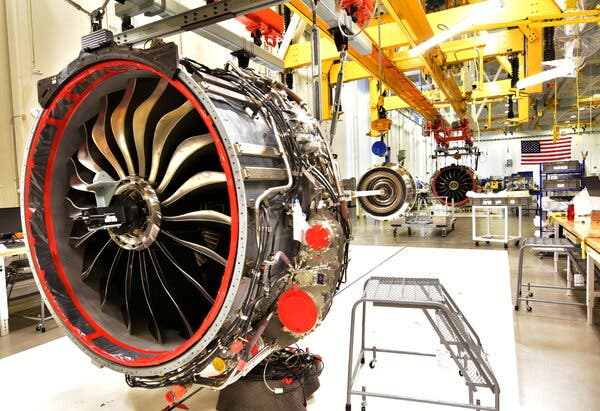
General Electric announced on Tuesday that it planned to break itself into three publicly traded businesses, the latest effort by the 129-year-old industrial conglomerate to simplify its business and lift its stagnant stock price.
The company said it would spin off its health care division in early 2023, and its energy businesses a year later. That would leave its aviation unit as its remaining business, which would continue to be led by its chairman and chief executive, H. Lawrence Culp.
“Today is a defining moment for G.E., and we are ready,” Mr. Culp said in a statement. “The momentum we have built puts us in a position of strength to take this exciting next step in G.E.’s transformation and realize the full potential of each of our businesses.”
Tuesday’s announcement is perhaps the most drastic effort yet by G.E. to reinvent itself, as it has struggled to bolster its fortune following the 2008 financial crisis.
Long regarded as a crown jewel of corporate America, with a legacy that traces back to Thomas A. Edison, the company in recent years has grappled with an unwieldy sprawl of operations and paid hundreds of millions to settle charges that it misled investors.
The company has moved to wind down its once vast financial arm and spin out or sell various businesses under pressure from investors, including Trian, the shareholder activist firm led by Nelson Peltz.
“Trian enthusiastically supports this important step in the transformation of G.E.,” said Ed Garden, Trian’s chief investment officer and a G.E. director. “We salute G.E. C.E.O. Larry Culp and his team’s efforts in driving long-term shareholder value.”
Shares in G.E. were up more than 10 percent in premarket trading following the announcement.
This is a developing story. Check back for updates.
Turmoil in China’s real estate sector could threaten the United States, the Federal Reserve said in a report on Monday.
In its twice-yearly update on the American financial system, the U.S. central bank said it was concerned both with how high the levels debt had grown in China’s corporate sector and with how Beijing was tackling the debt.
The financial troubles of China Evergrande Group, the world’s most indebted developer with a $300 billion debt pile, has set off panic in global financial markets and at home. What initially emerged as concern over one heavily indebted company has spread to a number of other real estate companies. Those developers are showing their own signs of stress as they struggle under mountains of debt and a property market slowed by tightening government controls over borrowing.
The regulatory focus, the Fed said, “has the potential to stress some highly indebted corporations, especially in the real estate sector, as exemplified by the recent concerns over China Evergrande Group.”
These stresses, in turn, could spill over into the broader economy.
“Given the size of China’s economy and financial system as well as its extensive trade linkages with the rest of the world, financial stresses in China could strain global financial markets through a deterioration of risk sentiment, pose risks to global economic growth, and affect the United States,” the Fed said.
At least six Chinese property developers have defaulted on foreign bonds in recent weeks, rattling domestic financial markets and raising the cost of borrowing for all Chinese companies. Property prices are slowing and fewer people are buying apartments, worsening the outlook for the sector. Evergrande, which has more than one million unfinished apartments across the country, is facing a deadline on Wednesday to make at least $150 million in bond payments.
After decades of binge borrowing, Chinese regulators have cut off real state sector funding. Many developers sold apartments and took payments from home buyers before they had completed the properties, creating a difficult situation not just for banks and investors but also for individual homeowners.
Macy’s said on Monday that it would raise its minimum wage to $15 an hour by May and start offering education benefits to employees in February.
The increase will lift Macy’s average base pay above $17 an hour, a company statement said. Macy’s did not specify its current minimum wage, but said it varied by location. The education program will cover tuition, books and fees for programs including high school completion, college preparation, and associate and bachelor’s degrees within a network. It is expected to cost the company $35 million over the next four years.
Macy’s will also offer employees an extra paid day off, it said.
Retailers have been scrambling to hire ahead of the all-important holiday season, which is expected to be bustling after a grim 2020. Many chains are raising wages and offering new benefits and additional flexibility in their pursuit of hourly workers.
Jeff Gennette, the chief executive of Macy’s, told The New York Times in a recent interview that there was “a war for talent at the front lines.” The retailer has said it aims to hire 76,000 full- and part-time employees this season.
For decades the British government has routinely approved offshore oil drilling projects in the North Sea.
But a proposed oil field in deep waters northwest of Scotland’s Shetland Islands has become a crucial test case for the government, environmental groups and the oil industry, The New York Times’s Stanley Reed reports.
Environmental activists want to stop the project from proceeding, and they have seized on Britain’s role as host of a major United Nations climate conference in Glasgow this month as an opportunity to confront the government over its continued support for the oil and gas industry. They point to studies that say new investment in fossil fuels must stop in order to curb global warming.
The energy industry says the British economy will need oil and gas for years to come.
Both sides agree that rejecting the project, known as Cambo, would signal death for the oil industry in Britain, and, perhaps, other countries.
“Rejection of Cambo would actually say we are not serious about energy policy in the U.K.,” said Mike Tholen, director for sustainability at Oil and Gas UK, an industry group.
For Caroline Rance, a campaigner for Friends of the Earth Scotland, “Cambo is a very egregious example of the U.K.’s climate hypocrisy,” she said. “This is the reason that Cambo has become such a big, iconic fight.”
A silicon shortage is upending the $500 billion chip industry, and many of the shifts are likely to outlive the pandemic-fueled dearth. The lack of the tiny components — which has pinched makers of cars, game consoles, medical devices and many other goods — has been a stark reminder of the foundational nature of chips, which act as the brains of computers and other products.
Chief among the changes is a long-term shift in market power from chip buyers to sellers, particularly those that own factories that make the semiconductors, The New York Times’s Don Clark reports. The most visible beneficiaries have been giant chip manufacturers like Taiwan Semiconductor Manufacturing Company, which offer services called foundries that build chips for other companies.
But the shortage has also sharply bolstered the influence of lesser-known chip makers such as Microchip Technology, NXP Semiconductors, STMicroelectronics, Onsemi and Infineon, which design and sell thousands of chip varieties to thousands of customers. These companies, which build many products in their own aging factories, now are increasingly able to choose which customers get how many of their scarce chips.
-
The Biden administration on Monday argued that the federal government had all the power it needed to require large employers to mandate vaccination of their workers against the Covid-19 virus — or to require those who refuse the shots to wear masks and submit to weekly testing.
In a 28-page filing before the United States Court of Appeals for the Fifth Circuit, which temporarily blocked the mandate with a nationwide stay last week, the Justice Department argued that the rule was necessarily to protect workers from the pandemic and was well grounded in law.
Keeping the mandate from coming into effect “would likely cost dozens or even hundreds of lives per day, in addition to large numbers of hospitalizations, other serious health effects, and tremendous costs,” the Justice Department said in its filing. “That is a confluence of harms of the highest order.” READ MORE →
-
Just days before workers at three Starbucks stores in the Buffalo area were scheduled to begin voting on unionization, both labor and management took steps that reflect the high stakes involved, including an attempt by Starbucks on Monday to delay the election.
The union filed a charge with the National Labor Relations Board last week accusing the company of unlawfully “engaging in a campaign of threats, intimidation, surveillance, solicitation of grievances and the closing of facilities” during the election campaign.
On Saturday afternoon, Starbucks closed stores in the area so workers could attend a talk by Howard Schultz, the company’s largest individual shareholder and its former chief executive, at a local hotel. READ MORE →
Rolls-Royce, the British jet engine maker, said on Tuesday that it was forming a new business to build a series of smaller, cheaper nuclear reactors as Britain looks for ways to cut carbon emissions and to reduce the costs of nuclear energy.
The kind of reactor proposed by Rolls-Royce would cover about two soccer fields, or about one-tenth the acreage of a conventional nuclear power station, the company said.
These plants would generate less power — about one-seventh the output of the giant nuclear installation being built at Hinkley Point in southwest England.
But Rolls-Royce said it hopes to reduce construction costs to around £2 billion ($2.7 billion) each, compared to an estimated £22.5 billion for the Hinkley Point plant. Some of the savings would come from building a large number of plants and making modules in factories that can then be assembled at sites.
The company hopes to build 16 of the plants, known as small modular reactors, and said each could power around one million homes.
The British government will contribute a grant of £210 million to develop the plants, while Rolls-Royce and its partners, including Exelon Generation, an American nuclear power company, and BNF Resources, a private company, would together invest £195 million over three years.
The government is looking for sources of clean power to replace Britain’s aging nuclear plants, although the Rolls-Royce models are unlikely to come online for at least a decade.
Along with being a tool for hitting ambitious emissions targets, the government also views the small nuclear program as a way to deliver on its promise to generate jobs in northern England, where Rolls-Royce said much of the investment would be based. The government also hopes to create an export industry supplying such plants to other countries.
Britain, though, is likely to encounter competition from France, which recently announced its own small reactor program, and the United States, where operators are working on similar concepts. Last week, Nuscale Power, based in Portland, Ore., announced an agreement to build small modular reactors in Romania.
Despite risks from accidents, nuclear energy is attracting new interest in Europe and elsewhere as a tool for countries to hit increasingly ambitious targets to reduce the carbon emissions responsible for climate change. Nuclear plants are valued for providing large amounts of low-carbon electricity.
Rolls-Royce’s work with nuclear power dates to the 1950s when it helped design Britain’s nuclear submarines.







